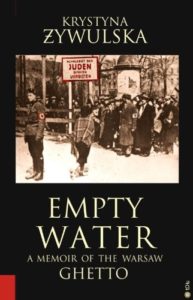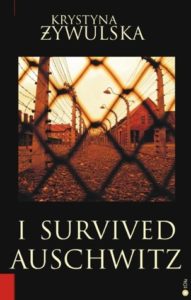Dramatic 30-minute scene for soprano and chamber ensemble (clarinet, violin, cello, bass, piano) with libretto by Gene Scheer, based on the life and work of Holocaust survivor Krystyna Zywulska. Commissioned by Music of Remembrance (Mina Miller, artistic director).
Composer Jake Heggie
Librettist Gene Scheer
Artists: Caitlin Lynch, soprano; Laura DeLuca, clarinet; Mikhail Shmidt, violin; Walter Gray, cello; Jonathan Green, double bass; Craig Sheppard, piano
World premiere: May 14, 2012, Benaroya Hall, Seattle, WA, at Music of Remembrance’s Holocaust Remembrance Day concert.
A dramatic song cycle commissioned by Music of Remembrance.
The concert launches the 2016 Powell-Heller Holocaust Conference on Women and the Holocaust.
This is MOR’s second commission from composer Jake Heggie and librettist Gene Scheer (after 2007’s For a Look or a Touch), and it tells of the day-to-day fight for survival of Krystyna Zywulska. Published just after the war, her memoir I Survived Auschwitz has long been a landmark in Polish literature on the Holocaust, but her songs and poems of resistance are just beginning to receive real attention.
With her mother, Krystyna walked out of the Warsaw ghetto in broad daylight in 1942, and joined the Polish resistance. Under the name Zofia Wiśniewska, she counterfeited identity cards and other documents. Captured by the Gestapo in 1943, she gave them the name Krystyna Żywulska and was eventually sent to Auschwitz-Birkenau. There, she began to write satiric poems that became camp anthems of resistance. One caught the attention of a more highly placed prisoner, who arranged to have the near-death Żywulska transferred to the Effektenkammer detail at Birkenau–staffing the storage rooms for prisoners’ personal effects. Her poetry had in all likelihood saved her life, but since her new barracks were right next to the crematorium, Żywulska no longer had any protection from the horror of a death camp’s purpose.
Professor Barbara Milewski writes in her entry on Krystyna Żywulska at the site Music and the Holocaust:
The exact number of Żywulska’s camp poems and songs remains uncertain, but at least eight complete texts survive. These are all invariably marked by a vivid realism, a quality of direct and sober reportage. Some like “Wycieczka w nieznane” very poignantly juxtapose the peaceful sounds and images of nature and life beyond the camp with the grotesque, death-ridden environment of Birkenau. Yet while sarcasm and irony prevail, Zywulska’s compositions seldom lapse into despair. Rather they most often exude life, specifically Żywulska’s own will to live, and deliver a powerful message of resistance.
Soprano Caitlin Lynch—a former Seattle Opera Young Artist who made her mainstage debut at Seattle Opera in 2011, as Micäela in Carmen—created the role of Krystyna.
Composer Jake Heggie, who was in touch with Zywulska’s son before embarking on the commission writes:
As a theater composer of opera and song, I’m particularly inspired by stories of social justice, the inequities of life, and how we are all connected as human beings despite those inequities. Stories of personal redemption, transformation, and transcendence speak loudly to me in musical terms. My opera Dead Man Walking dealt with families involved in the issue of capital punishment; the short opera To Hell and Back is about abused women; and Three Decembers explores how a family responds to mental illness, suicide and separation.
The full breadth of Krystyna Zywulska’s work as a memoirist, poet and satirist is still being revealed and given new appreciation; her story cries out to be told through theater and poetry.
Jake Heggie and Gene Scheer offer the following remarks about Another Sunrise:
The woman we know today as the author and lyricist Krystyna Zywulska was a Holocaust survivor with an astonishing, complex, sometimes baffling history. Born Sonia Landau in 1914 to a Jewish family in Lódz, Poland, she was studying law at Warsaw University when World War II erupted. In 1941, she and her family were relocated to the Warsaw ghetto. One day, seeing a window of opportunity, Sonia and her mother bravely walked out of the ghetto in broad daylight, leaving her father behind. She adopted the name Sophia Wisniewska and worked for the underground resistance until she was arrested by the Gestapo in 1943. Refusing to name names to the Nazis, she changed her own name to Krystyna Zywulska (born in 1918 rather than 1914) and was sent to Auschwitz-Birkenau as a political prisoner—not as a Jew.
As a prisoner, with no experience as a writer, Krystyna crafted lyrics of protest and survival and set them to well-known folk tunes and popular melodies. Since it was suicide to write them down, her lyrics were passed along by word of mouth from inmate to inmate throughout the camp. A fellow inmate in a position of authority was moved by Krystyna’s work and decided to save the “camp poet.” After a year of disease, lice, and backbreaking labor in the fields, Krystyna was given one of the few choice jobs inside the Effektenkammer (warehouse of personal effects).
Here, she and her co-workers took inventory and took charge of the possessions that thousands upon thousands of Jewish women and children from all over Europe brought with them to the camp. Often, once their possessions had been taken and catalogued, these prisoners were marched next door to the ovens for execution. Krystyna heard the screams and cries, saw the smoke, smelled the stench, and had to live in an almost unimaginable situation: to survive, she had to take and catalogue the personal belongings of Jewish women and children, then hear them murdered next door.
At the end of the war, during a death march when the camp was being evacuated, Krystyna once again escaped and survived. After the war, she chronicled the atrocities she witnessed in a startlingly candid memoir, I Came Back (also titled I Survived Auschwitz), published in 1946. However, she still did not claim her Jewish identity or ancestry. In the book, one feels strongly that Krystyna wanted to explain what happened without holding back.
The book is honest, revealing and profoundly moving. It also, curiously, compels one to wonder about the nature of memory and the parts of the past that remain in the shadows despite one’s best efforts. It is those shadows, those empty places, Another Sunrise explores.
Krystyna Zywulska died in 1993, having reclaimed her Jewish identity in the 1960s. Late in her life, she was interviewed by Professor Barbara Engleking for her book Holocaust and Memory (published in Polish in 1994 and English in 2001). In Zywulska’s responses to Engleking’s questions, one can sense her frustration in trying to find language that might adequately describe the enormity of what happened, or the extraordinary complexity in a fog of memories.
In that interview, a woman whose words had saved her life now struggles to find words to describe what happened. It is this irony that prompted the idea for Another Sunrise.
Of course, it is not that she couldn’t find words: it is that none could ever truly describe what she and millions of others experienced. The past is thus clouded not by a lack of willingness to define what happened, but rather by the limits of language itself. Like the uncertainty principal that governs the quantum heart of the world, history too seems to be ruled by immutable paradoxes. If you measure something, you change it. If you describe something, you change it as well—even the past.
Another Sunrise is about the struggle to describe harrowing, unimaginable situations to people who weren’t there. It is also about what it is to survive. Like many who make it through a war, Krystyna survived not through grand acts of heroism, but through near maddening acts of survival. We do whatever it takes to live another day: to see another sunrise.
We thank Mina Miller for bringing Krystyna Zywulska’s story to our attention and for giving us the opportunity to create another new work for Music of Remembrance. Another Sunrise is lovingly dedicated to Mina, who reminds us all what it is to remember.
the source: musicofremembrance.org



Recent Comments